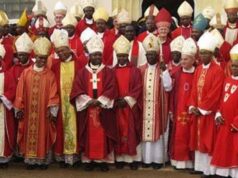
Weighed down by N1.3 trillion debts to power Generation Companies (GenCos) and another $1.3 billion to gas firms, the Federal Government might no longer be in a position to sustain the subsidy on electricity.
Power Minister Adebayo Adelabu, who dropped the hint yesterday at a news conference, said that N2.9 trillion would be needed to fund electricity subsidy this year.
Adelabu described the paltry N450 billion budgeted for subsidy in the 2024 Appropriation Act as a far cry from the requirement .
According to him, the time has come for the nation to take a decision on whether electricity is a commercial utility or a social service.
He listed the implementation of a cash reflective tariff, or cashed-backed government guaranteed subsidy regime to inject liquidity to the sector as the options open to the government for the funding of the over 80 per cent deficit between the N2.9 trillion and N450 billion.
The minister said: “What was made provision for in the budget for subsidy is N450 billion. And we require N2.9 trillion for subsidy. Can we afford it? Let’s be realistic. Can we afford it? N450 billion is less than 20 per cent of the almost N3 trillion that is required for subsidy if we must continue at this time.
“These are the things we need to discuss as a nation. But, depending on the outcome of the decision of whether electricity is a commercial product or social service. Or either we implement a cost reflective tariff or in the alternative a cashed backed federal government guaranteed subsidy regime to inject liquidity to the sector.”
Adelabu, who identified paucity of cash as the major constraint to steady power supply, noted that the government has not funded subsidy since January.
According to him, the government is currently owing electricity generation companies (GenCos) N1.3 trillion aside a legacy debt of $1.3 billion to gas companies.
He said the government is planning the “settlement of existing sectoral outstanding debt obligations to the gas supply and power generation companies using partly cash payment and guaranteed debt instruments”.
Adelabu pointed out that between September last year and now, the Nigerian Electricity Supply Industry (NESI) has recorded six grid collapses.
On the grid that has collapsed for about six times between December 2023 and now, he said this was caused by shortage of gas, ageing machines in the grid value chain, low capacity to evacuate generated power, and destruction of power stations in some parts of the Northeast geopolitical zone.
He said the Transmission Company of Nigeria (TCN) has over 100 abandoned projects due to variations on contract figures as a result of the fluctuations of the forex, hence the company will not award any new contracts till all such projects are completed.
The minister said: “I have witnessed up to eight destruction of transmission assets. There are saboteurs that are thwarting the efforts of the ministry and its agencies to improve power supply to the people”.
The minister said he was in talks with the National Security Adviser (NSA), Malam Nuhu Ribadu, on how to bring the power asset vandals to book.
Adelabu spoke of a plan by the government to procure Supervisory Control and Data Acquisition (SCADA) for the power industry.
Asked when the SCADA will be installed, he said the ministry is working with a World Bank support two-year project to install the data.
He said plans are underway for renewable energy generation from the states to boost off-grid energy supply without issues of system collapse.
He insisted that with the amended 2024 Electricity Act, states governments are now in the best positions to provide oversight to the DisCos.
“But a state governor or ministry, or state electricity board must know the DisCos they are dealing with,” Adelabu said.
He vowed that the government will not hesitate to revoke the license of any non-performing DisCo.
According to him, there are still eight million unmetered customers in the NESI.
He noted that the government will now assist the DisCos to provide transformers.
The minister said the government, through the Rural Electrification Projects, is spending N50 billion to install solar energy in universities, teaching hospitals and even in the Federal Ministry of Power House in Abuja.


















































